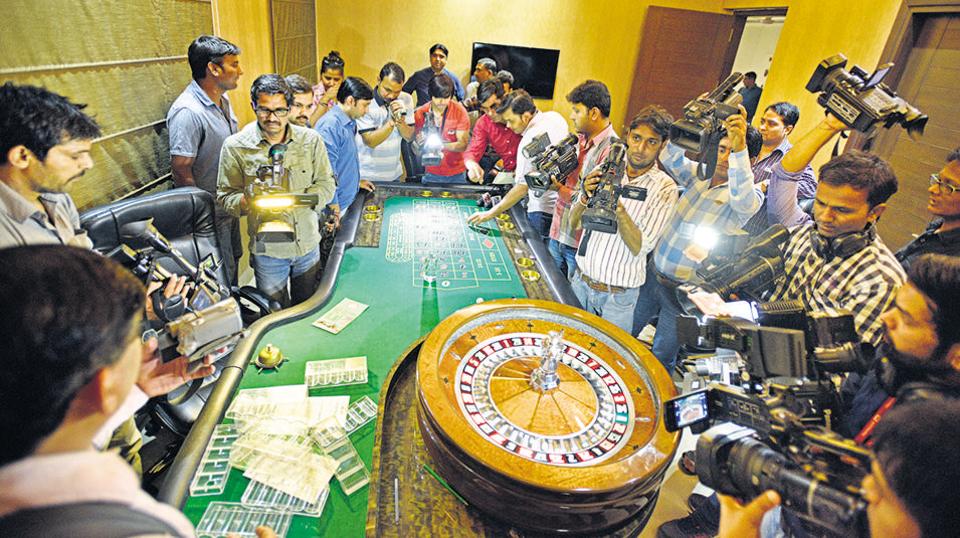Is a Casino Legal in India?
Casinos are legal in India, but only in certain states. Goa, Sikkim, and Daman permit casino operations under specific

Casinos are legal in India, but only in certain states. Goa, Sikkim, and Daman permit casino operations under specific regulations.
Gambling in India has a complex legal landscape. Most forms of gambling are prohibited, but some states have made exceptions. Goa, Sikkim, and Daman are notable for their legal casinos. These states regulate casino operations to ensure fair play and prevent illegal activities.
Casinos in these regions attract tourists and contribute to the local economy. Online gambling remains a gray area, with varying laws across states. It’s crucial to understand the specific regulations of each state. This helps avoid legal issues and ensures a safe gambling experience. Responsible gambling is encouraged to prevent addiction and financial loss.

Legal Framework
The legal framework for casinos in India is complex. It involves both national and state laws. This section explores these laws in detail. Understanding these rules is crucial for anyone interested in casinos in India.
National Laws
India’s national laws impact casino legality. The Public Gambling Act of 1867 is the primary law. This act prohibits operating a public gambling house. The law also penalizes visiting such places.
Yet, the law is old and lacks clarity. It does not mention online gambling. As a result, interpretation varies. Some believe online casinos are legal. Others think they are illegal.
Another national law is the Information Technology Act of 2000. This act deals with online activities. It has provisions against online betting. But, it is not specific about online casinos. This adds to the confusion.
State Regulations
Indian states have the power to create their own gambling laws. This results in diverse regulations across the country. States like Goa, Sikkim, and Daman allow casinos. They have specific licenses and regulations.
In Goa, the Goa, Daman, and Diu Public Gambling Act of 1976 allows casinos. Sikkim has the Sikkim Casino Games (Control & Tax) Act, 2002. These acts set rules for casino operations in these states.
Some states are more restrictive. For example, in Maharashtra, the Bombay Wager Act bans all forms of gambling. Tamil Nadu and Andhra Pradesh also have strict laws against gambling.
The table below highlights the casino regulations in different states:
| State | Casino Regulation |
|---|---|
| Goa | Allowed with licenses |
| Sikkim | Allowed with licenses |
| Daman | Allowed with licenses |
| Maharashtra | Prohibited |
| Tamil Nadu | Prohibited |
| Andhra Pradesh | Prohibited |
Understanding these state regulations is essential. They determine where casinos can operate. Each state has its own rules. This creates a patchwork of laws across India.

Types Of Casinos
In India, there are two main types of casinos: land-based casinos and online casinos. Both offer unique experiences and have different legal standings. Let’s explore each type in detail.
Land-based Casinos
Land-based casinos are physical establishments where people play casino games. These casinos are located in specific regions where gambling is legal.
- Goa: Goa is famous for its casino culture. Many casinos operate on boats.
- Sikkim: Sikkim also has legal land-based casinos. They attract many tourists.
- Daman: Daman is another place with legal casinos. It is a growing hub for gamblers.
These casinos offer games like poker, roulette, and blackjack. They follow strict regulations to ensure fair play. Entry to these casinos is restricted to people above 21 years of age.
Online Casinos
Online casinos are virtual platforms where people gamble on the internet. These casinos offer games similar to land-based casinos but in a digital format.
Here are some features of online casinos:
- Accessibility: You can access online casinos from anywhere.
- Variety: They offer a wider range of games than physical casinos.
- Convenience: Play at any time without leaving your home.
Online casinos in India operate under different legal frameworks. Some states ban online gambling, while others allow it. Always check the local laws before playing.
Many online casinos offer bonuses to attract players. These can include free spins, deposit bonuses, and cashback offers.
Online casinos must follow strict security measures. They use encryption to protect players’ data and ensure fair play.
Popular Casino Destinations
India offers a few legal casino destinations. These places attract many visitors. Let’s explore popular casino spots in India.
Goa
Goa is a famous casino hub in India. It has many casinos. Goa’s casinos are on land and on boats. These floating casinos are very popular. They offer a unique gaming experience. Some famous casinos include:
- Deltin Royale
- Casino Pride
- Deltin Jaqk
These casinos offer various games. You can play poker, roulette, and blackjack. Goa’s casinos also have amazing food and drinks. You can enjoy entertainment shows as well.
Sikkim
Sikkim is another legal casino destination. It is located in Northeast India. Sikkim has a few casinos in its capital, Gangtok. These casinos offer a cozy gaming environment. Some well-known casinos in Sikkim are:
- Casino Mahjong
- Casino Deltin Denzong
Sikkim’s casinos offer a variety of games. You can play slots, poker, and other table games. They also provide great hospitality and services. These casinos are perfect for a peaceful gaming experience.
Economic Impact
The economic impact of legalizing casinos in India is significant. It influences several sectors, creating both direct and indirect benefits. This section explores how a legal casino industry can boost the economy through tourism and revenue generation.
Tourism Boost
Legal casinos attract tourists from all over the world. Tourists spend money on local services such as hotels, restaurants, and transport. This influx of visitors increases the demand for local products. Local businesses thrive as a result.
In regions with casinos, employment opportunities grow. Jobs in hospitality, security, and entertainment become available. This reduces unemployment and improves living standards. A vibrant tourism industry also promotes cultural exchange, enriching local communities.
Revenue Generation
Legal casinos contribute significantly to government revenue. Through taxes and licensing fees, the government earns substantial income. These funds can be used for public services like education and healthcare.
The table below shows potential revenue sources:
| Revenue Source | Potential Income |
|---|---|
| Taxes | Millions of Rupees |
| Licensing Fees | Millions of Rupees |
Local businesses also benefit from increased spending by casino visitors. This boosts the economy further, creating a cycle of prosperity. The revenue generated can lead to improved infrastructure. Better roads, schools, and hospitals benefit everyone.
Future Prospects
The future of casinos in India is a topic of much debate. With changing laws and a growing market, the landscape of gambling is evolving. Let’s explore the potential future of casinos in India under the headings of Legislative Changes and Market Growth.
Legislative Changes
India’s legal framework for casinos is complex. Currently, only a few states allow legal gambling. These states include Goa, Sikkim, and Daman. The central government has shown interest in regulating the industry. This could lead to uniform laws across all states.
Several bills are under consideration to modernize gambling laws. These bills aim to create a safe and regulated environment for players. If passed, these laws could pave the way for more casinos across India. This would also bring in more revenue for the government.
States are also considering the benefits of legalizing casinos. Legal casinos could generate jobs and boost tourism. This could lead to more states adopting favorable laws for casinos in the near future.
Market Growth
The market for casinos in India is growing rapidly. The rise of online gambling has played a significant role in this growth. More people have access to online casinos than ever before. This has led to increased interest in physical casinos as well.
India’s young population is tech-savvy and curious about new forms of entertainment. This demographic is driving the demand for modern casinos. With the right regulations, the casino industry in India could see exponential growth.
Investors are also eyeing the Indian market. Several international casino brands are planning to enter India. These brands bring experience and high standards of operation. This could elevate the quality of casinos in the country.
The potential for market growth is immense. As regulations become clearer, more players and investors will enter the market. This will create a vibrant and dynamic casino industry in India.
Frequently Asked Questions
Is Casino Illegal In India?
Casino gambling is largely illegal in India. Exceptions include Goa, Daman, and Sikkim, where it’s regulated and permitted. Online gambling laws are unclear.
Why Are Indian Casinos Legal?
Indian casinos are legal due to the Indian Gaming Regulatory Act of 1988. This act allows tribes to operate casinos on tribal lands. It aims to promote tribal economic development, self-sufficiency, and strong tribal governments. States and tribes must create compacts to regulate casino operations.
Are Casino Days Legal In India?
Casino Days operates online and is accessible in India. Online gambling laws in India are unclear, so proceed cautiously.
Why Is Casino Legal In Goa?
Casinos are legal in Goa due to the Goa, Daman and Diu Public Gambling Act of 1976. This law permits regulated gambling in designated areas.
Conclusion
Understanding the legality of casinos in India is crucial for both operators and players. Each state has its own laws. It’s important to stay informed and compliant. Always research local regulations before participating. The landscape is evolving, so keep an eye on legal updates.
Enjoy responsibly and stay within the law.















